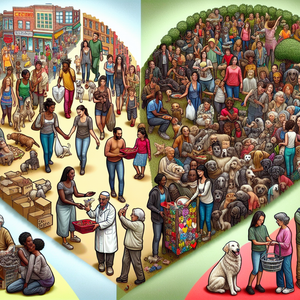The Art of Localized Design: How Denver's Landscape Shapes Website Aesthetics

Denver's proximity to the majestic Rocky Mountains serves as a continuous source of inspiration for local web designers. The mountains not only offer stunning visuals but also inspire color palettes, imagery, and themes that evoke a sense of adventure and tranquility. Many designers incorporate earthy tones and natural textures into their work, mirroring the rugged landscape that defines the region. For instance, a web design project for a local outdoor gear company showcases high-resolution images of the Rockies and nearby trails, appealing directly to outdoor enthusiasts. The website employs a color scheme that reflects the greens and browns of the forests and the vibrant blues of the sky, creating an immersive experience that invites users to explore the great outdoors. This connection between the product and the local environment enhances the brand’s authenticity and appeal, allowing it to build a loyal customer base that identifies with its roots.
Cultural Diversity and Artistic Expression
Denver's rich cultural heritage is another critical aspect that influences the creative output of its designers. The city is home to a diverse array of communities, each contributing unique artistic styles, traditions, and narratives. From the colorful murals of the RiNo (River North) Art District to the myriad cultural festivals celebrating various ethnicities, these influences are often reflected in the graphic elements and typography choices made by local designers. A design studio in Denver may draw direct inspiration from the vibrant street art that characterizes the city, integrating bold graphics and playful fonts that reflect the urban culture. For example, a local restaurant's website might feature dynamic visuals that mirror the energy of its neighborhood, creating a visually striking online presence. By infusing local artistry into their designs, companies can foster a sense of community and belonging, establishing a deeper emotional connection with both residents and visitors.
The Fusion of Nature and Technology
As the digital landscape evolves, web designers face the challenge of merging natural elements with technological innovations. Denver's web design firms are at the forefront of this fusion, utilizing responsive design techniques that enhance user experience while remaining true to local aesthetic values. Consider the example of a tech startup specializing in eco-friendly products. Their website features a dynamic layout that seamlessly adjusts to various devices while incorporating organic shapes and imagery reminiscent of Colorado's flora. This ensures users enjoy a consistent experience, whether browsing on a desktop or mobile device, while reinforcing the company's commitment to sustainability—a value deeply embedded in Denver's ethos. The blending of nature-inspired visuals with cutting-edge technology creates a compelling user experience that resonates with the environmentally-conscious audience.
Community Engagement and Feedback
Community engagement is a cornerstone of Denver’s design philosophy. Many local firms prioritize collaboration and feedback from clients and their target demographics to shape their projects. By working closely with clients and actively seeking community input, designers can ensure their work reflects the values and aspirations of the local population. For example, a website redesign for a nonprofit organization focused on environmental conservation involved extensive community input. Designers conducted workshops and feedback sessions to gather insights from local residents about their expectations and desires for the site. This collaborative effort resulted in a design that was not only well-received but also fostered a sense of ownership and pride among community members. Such engagement reinforces the idea that design is a shared experience, creating a more tailored and impactful online presence.
The interplay between Denver’s stunning landscape and its website design companies illustrates the profound impact that geography and culture have on creativity. By drawing inspiration from the Rocky Mountains, embracing local artistic expression, and prioritizing community engagement, Denver’s designers create websites that are visually stunning and deeply rooted in the city’s identity. As the digital landscape continues to evolve, the unique perspectives offered by local influences will shape the future of web design, ensuring that the spirit of Denver remains alive and vibrant in the digital realm. In a world where authenticity is key, Denver's localized design approach serves as a powerful reminder of how place and culture can enrich the online experience for users everywhere.
User Experience (UX) Designer
Local tech startups, digital agencies, and larger corporations with a focus on customer-centric products.
Core Responsibilities
Conduct user research and usability testing to understand user needs and behaviors, ensuring designs are intuitive and user-friendly.
Create wireframes, prototypes, and user flow diagrams that effectively communicate design ideas and functionality.
Collaborate with developers and stakeholders to implement design solutions that enhance user satisfaction across web platforms.
Required Skills
Proficiency in design software such as Sketch, Figma, or Adobe XD.
Strong understanding of user-centered design principles and best practices.
Experience with HTML/CSS is a plus, enabling better communication with development teams.
Web Content Strategist
Digital marketing agencies, nonprofit organizations, and e-commerce companies.
Core Responsibilities
Develop and execute content strategies that align with business goals and enhance user engagement on websites.
Conduct content audits and competitor analysis to inform content creation and optimization efforts.
Collaborate with designers and developers to ensure that content is effectively integrated into the overall website experience.
Required Skills
Excellent writing and editing skills, with a keen eye for detail and a strong understanding of SEO best practices.
Familiarity with content management systems (CMS) like WordPress or Drupal.
Strong analytical skills to measure content performance and adapt strategies accordingly.
Front-End Web Developer
Web development firms, tech startups, and e-commerce platforms.
Core Responsibilities
Translate design mockups and prototypes into responsive and functional web pages using HTML, CSS, and JavaScript.
Optimize websites for performance, ensuring fast load times and a smooth user experience across devices.
Work closely with UX/UI designers to implement visual elements and ensure consistency in design.
Required Skills
Proficiency in JavaScript frameworks such as React or Vue.js.
Experience with version control systems like Git for collaborative coding.
Knowledge of accessibility standards to create inclusive web experiences.
Graphic Designer with a Focus on Web UI
Creative agencies, in-house marketing teams, and freelance opportunities.
Core Responsibilities
Design visually appealing and user-friendly graphics for websites, ensuring alignment with brand identity and market trends.
Create assets such as icons, banners, and infographics that enhance the user experience across digital platforms.
Collaborate with marketing teams to produce graphics for campaigns that leverage the website's design.
Required Skills
Proficiency in design tools like Adobe Creative Suite (Photoshop, Illustrator, InDesign).
Strong understanding of color theory, typography, and layout principles in digital design.
Ability to work with responsive design principles to ensure graphics adapt to various screen sizes.
Digital Marketing Specialist
Marketing agencies, tech companies, and nonprofit organizations focused on community outreach.
Core Responsibilities
Develop and implement online marketing strategies to drive traffic and engagement on websites, including SEO, PPC, and social media marketing.
Analyze website performance metrics using tools like Google Analytics to inform marketing decisions and optimize campaigns.
Create and manage content calendars that align with promotional goals and community engagement initiatives.
Required Skills
Strong understanding of digital marketing techniques and tools, including social media platforms and email marketing.
Excellent analytical skills to interpret data and make informed marketing decisions.
Experience with graphic design tools for creating marketing assets is a plus.


